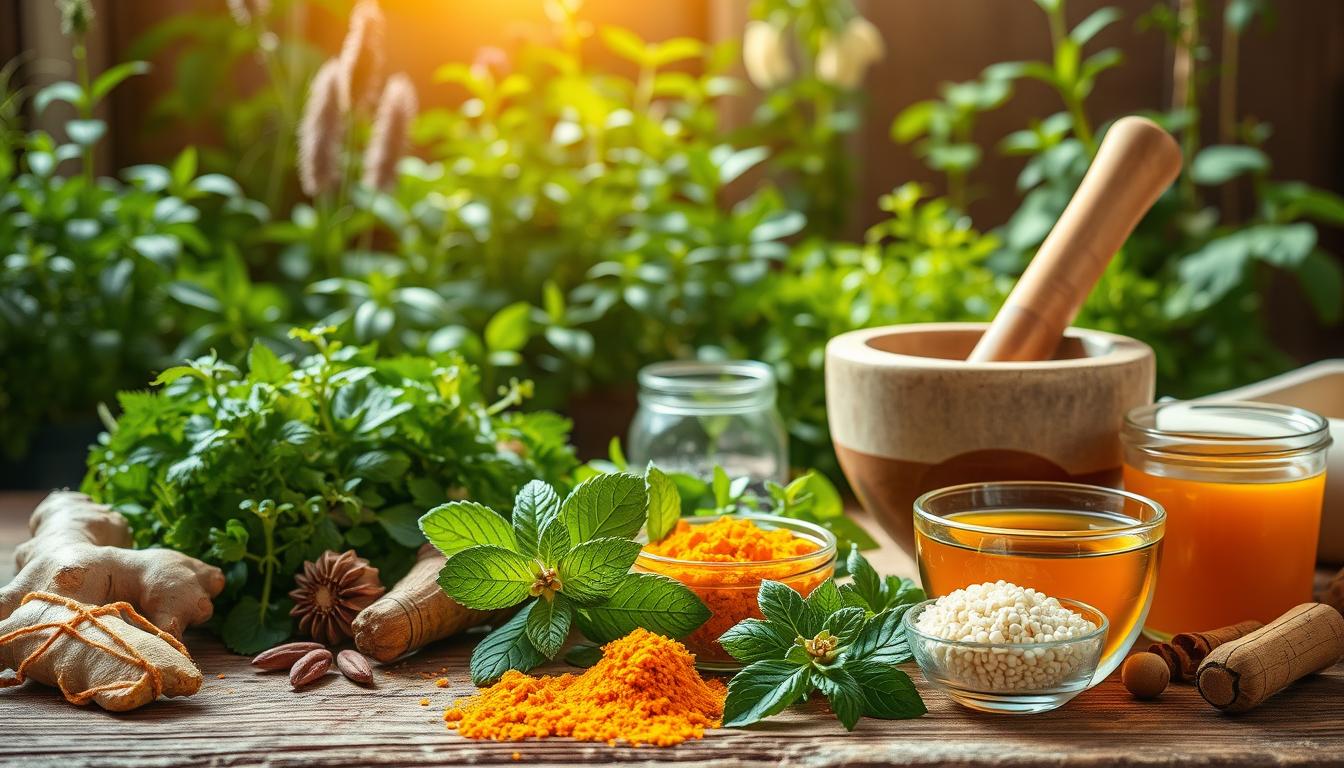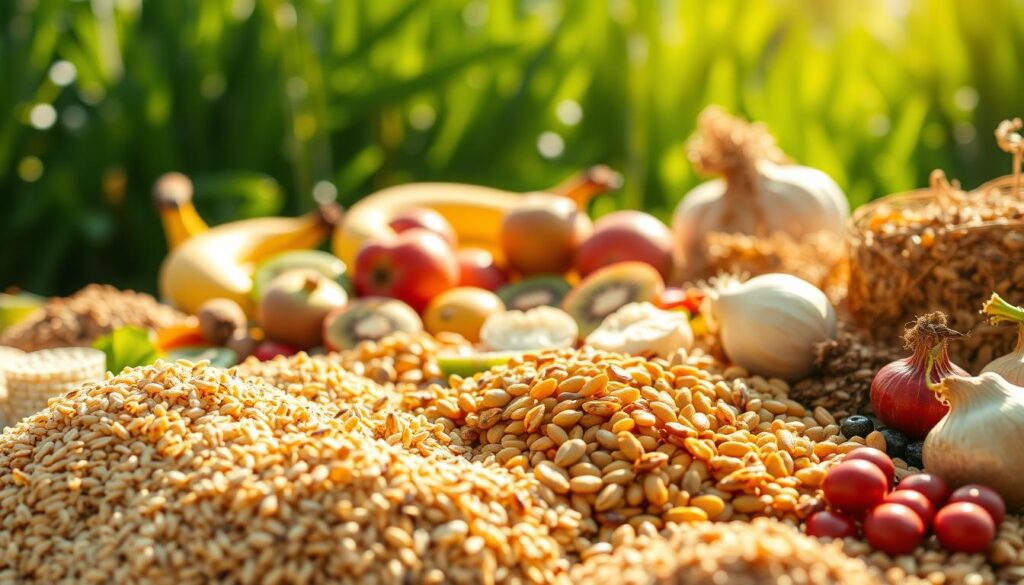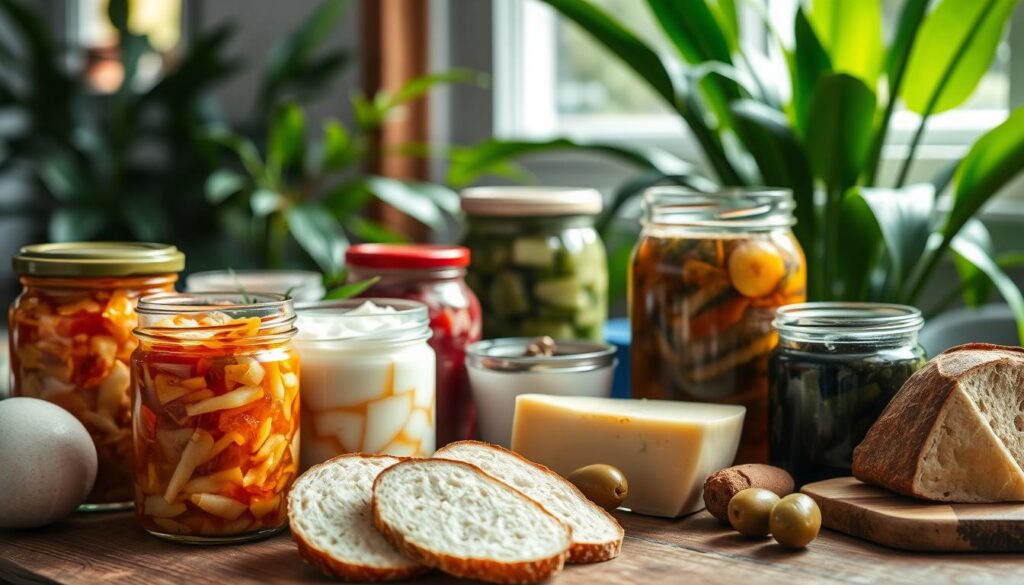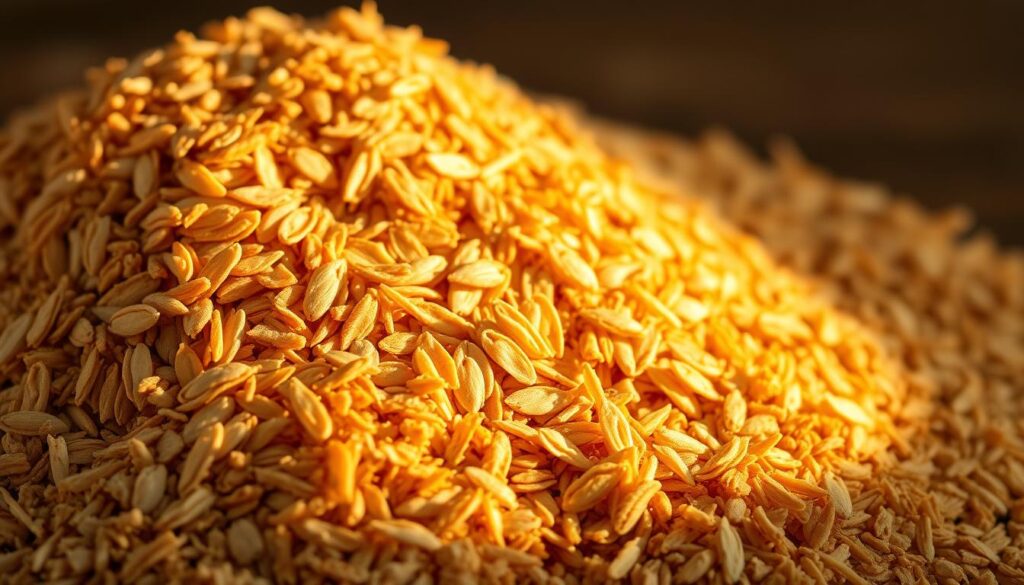Natural Remedies for Gut Health
Keeping your healthy gut is key for feeling good. Your gut helps with digestion, keeps you…

Keeping your healthy gut is key for feeling good. Your gut helps with digestion, keeps you healthy, and even affects your mind. Using holistic approaches can help your gut and make life better.
Medical News Today says many ways can help your gut. Taking probiotics and eating prebiotic fiber are good starts. Simple changes in what you eat and how you live can really help your gut. This can make you feel better overall.
Key Takeaways
- Probiotics support gut health
- Prebiotic fiber aids digestion
- Fermented foods enhance gut microbiome
- Dietary changes can improve gut health
- Lifestyle modifications support overall well-being
- Gut health is linked to mental health
Understanding Gut Health: Why It Matters
Your gut health is key to feeling good. It affects how you digest food and keeps your immune system strong. A balanced gut is important for health.
The Importance of a Healthy Gut
A healthy gut helps you digest food well and absorb nutrients. It also boosts your immune system. A balanced gut keeps you healthy and happy.
Using gut health supplements like probiotics is a good idea. Eating foods high in fiber and staying hydrated also helps. Managing stress is important for your gut.
Common Gut Health Issues
Many people face gut health problems. These include bloating, gas, and constipation. Stress and poor diet can cause these issues.
- Bloating and gas
- Constipation and diarrhea
- Irritable Bowel Syndrome (IBS)
- Other digestive discomforts
How Gut Health Affects Overall Well-being
Your gut health affects your overall health. A healthy gut means a strong immune system and good digestion. It also helps your mental health.
By focusing on gut health, you improve your life. Eat well, consider supplements, and live a healthy lifestyle. This keeps your gut and body healthy.
The Role of Probiotics in Gut Health
Probiotics are key for a healthy gut. They help keep your gut balanced. This is good for digestion, immunity, and even your mind.

What Are Probiotics?
Probiotics are live helpers in your gut. They keep your gut healthy. You can find them in foods or take them as pills.
Foods Rich in Probiotics
Eating foods with probiotics is great for your gut. Here are some good ones:
- Yogurt (with live cultures)
- Kimchi (a Korean veggie dish)
- Kefir (a milk drink)
- Sauerkraut (fermented cabbage)
- Miso (fermented soybean paste)
These foods are not just good for your gut. They also have vitamins and minerals.
Probiotic Supplements: Pros and Cons
Some people take probiotic pills too. They can help with gut problems like IBS. But, pick a good one that works well.
But, pills can cause side effects like bloating. Also, not all pills are the same. Always talk to a doctor before taking any pills.
Prebiotics: Fuel for Your Gut
Prebiotics are the unsung heroes of gut health. They give probiotics the fuel they need to grow. Prebiotics are non-digestible fibers that feed the good bacteria in your gut.
The Power of Prebiotics
Prebiotics are a special type of dietary fiber. They feed the good bacteria, helping them grow and work well. This can make your immune system stronger, improve digestion, and even help your mental health.

Top Prebiotic Foods to Include
Here are some top prebiotic foods you can add to your meals:
- Asparagus
- Bananas
- Onions
- Garlic
- Whole wheat bread
- Oats
- Barley
These foods are not only full of prebiotics but also easy to use in your meals.
How Prebiotics Support Probiotics
Prebiotics and probiotics work together for gut health. Probiotics add good bacteria, while prebiotics give them the food they need. This teamwork is vital for a healthy gut microbiome.
By adding prebiotics to your diet, you help probiotics grow. This leads to better gut health and a stronger you.
The Benefits of Fermented Foods
If you want to make your gut healthier, try fermented foods. They are full of probiotics, which are good for your gut. People have eaten these foods for a long time. They taste great and are good for you.

What Are Fermented Foods?
Fermented foods are made when tiny living things like bacteria or yeast work on them. They turn sugars into acids, gases, or alcohol. This makes the food last longer and more nutritious.
Some examples are sauerkraut, kimchi, kefir, yogurt, and miso. These foods are full of probiotics. They help keep your gut healthy by keeping the good bacteria in balance.
Examples of Gut-Friendly Fermented Foods
Here are some great fermented foods for your gut:
- Sauerkraut: It’s full of vitamins and probiotics. It helps your immune system and gut.
- Kimchi: A spicy Korean dish, it’s made from veggies. It’s full of probiotics and vitamins.
- Kefir: It’s a fermented milk product. It has good bacteria and yeast. It helps with digestion and gut health.
For more info on fermented foods, check out studies on gut health. They show how these foods can make you feel better.
How to Incorporate Fermented Foods
Adding fermented foods to your diet is easy and tasty. Try adding sauerkraut or kimchi to your meals. Or use kefir instead of yogurt. You can even make your own fermented foods at home.
By eating fermented foods, you’re making your gut healthier. You’re also trying new tastes and learning about different cultures. Exploring fermented foods can change how you see food and improve your health.
The Impact of Dietary Fiber on Digestion
Dietary fiber is key for a healthy gut. It helps your body absorb nutrients and stay regular. It also keeps your gut microbiome in balance.
Soluble vs. Insoluble Fiber
Dietary fiber is two types: soluble and insoluble. Soluble fiber turns into a gel in water. It slows down digestion. You find it in oats, nuts, and fruits like apples.
Insoluble fiber doesn’t dissolve in water. It makes stool bulkier. This helps you go to the bathroom regularly. You can find it in whole grains and veggies.

High-Fiber Foods for Gut Health
Eating foods high in fiber is good for your gut. Here are some top picks:
- Legumes like beans, lentils, and peas
- Whole grains like brown rice and quinoa
- Fruits like apples and bananas
- Vegetables like broccoli and carrots
- Nuts and seeds like almonds and chia seeds
These foods are not just high in fiber. They also have vitamins, minerals, and antioxidants for health.
Tips for Increasing Fiber Intake
It’s easy to eat more fiber. Here are some tips:
- Start your day with a high-fiber breakfast, like oatmeal with fruits and nuts.
- Gradually increase your fiber intake to let your gut adjust.
- Choose whole grains over refined ones for meals.
- Snack on fruits and vegetables to get more fiber.
- Try new recipes with legumes, nuts, and seeds.
By following these tips, you can boost your digestive health and feel better overall.
Herbal Remedies for Gut Health
Nature has many herbal remedies for a healthy gut. For a long time, herbs have helped with digestion. Adding these natural remedies to your day can help your gut stay balanced.
Peppermint: Calm Your Gut
Peppermint is a top choice for gut health. It calms your stomach. Peppermint tea, fresh leaves, or oil capsules can help.
Ginger: Natural Digestive Aid
Ginger is great for digestion. It has compounds that help digestion and reduce nausea. You can drink ginger tea, cook with fresh ginger, or take supplements.
Chamomile: Soothing Benefits
Chamomile is known for its soothing effects. It helps with digestion and stress. Drinking chamomile tea before bed is a good way to start.
Exploring herbal remedies can help your gut health. Peppermint, ginger, and chamomile are good choices. They can make your gut and overall health better.
The Importance of Hydration
Drinking enough water is simple but very helpful for your gut health. It’s key for your gut to work right and avoid constipation. Water breaks down food, starts digestive enzymes, and moves nutrients to your cells.
Water’s Role in Digestive Health
Water is very important for good digestion. It stops constipation by making stool soft and helping you go to the bathroom regularly. It also helps digest food and absorb nutrients, so your body gets the most from what you eat.
Adequate hydration keeps the lining of your intestines healthy. This lining is important for absorbing nutrients and keeping bad stuff out of your blood.
Recognizing Dehydration
Dehydration can cause many digestive problems, like constipation and less digestive enzyme activity. Signs include dry mouth, feeling tired, dizzy, and dark urine. If you see these signs, drink more water.
Watching how your body reacts to water is important. If you feel better when you drink more, it shows water is helping your gut.
Tips for Maintaining Hydration
Try to drink at least eight glasses of water a day. But, how much you need can change. You can also eat foods with a lot of water, like cucumbers, celery, and watermelon.
- Drink a glass of water when you wake up to rehydrate after sleep.
- Carry a water bottle with you all day to remind you to drink.
- Eat foods that help you stay hydrated in your meals and snacks.
By focusing on drinking enough water, you help your gut and overall health. A hydrated body can digest food better, absorb nutrients, and keep your gut healthy.
Mindful Eating for Gut Wellness
Mindful eating is great for your stomach and more. It helps you digest better, feel less stressed, and love food more.
Practicing Mindful Eating
Mindful eating means paying full attention to eating. Notice the food’s colors, smells, and tastes. Also, feel your hunger and fullness.
Start by turning off the TV and phone. Eat slowly and enjoy each bite. Listen to your body’s hunger and fullness signals.
The Connection Between Stress and Digestion
Stress hurts your stomach, causing discomfort and bloating. It makes your body focus on stress, not digestion. Mindful eating helps your body relax and digest better.
Techniques for Reducing Meal Time Stress
To eat less stressed, try relaxing before meals. Take deep breaths or meditate for a bit. Appreciate your food.
- Use all your senses to enjoy your meal.
- Chew slowly and thoroughly.
- Pause between bites to assess your fullness.
Mindful eating makes eating better for you. It helps your stomach and makes you feel good overall.
Lifestyle Changes That Support Gut Health
Making a few key lifestyle adjustments can have a big impact on your gut health. By adding simple changes to your daily routine, you can greatly improve your well-being.
Regular Exercise for a Healthy Gut
Regular physical activity is good for your health and helps your gut stay healthy. Exercise helps with digestion and improves the gut microbiome. Aim for at least 30 minutes of moderate-intensity exercise per day to support gut health.
Exercise also helps your gut and brain talk better. This can lead to better digestion and fewer gut problems. Yoga, walking, and cycling are great choices.
Sleep’s Role in Digestion
Getting enough sleep is key for a healthy gut. Poor sleep can upset your gut microbiome and cause digestive issues. Prioritize getting 7-9 hours of sleep per night to support gut health and overall well-being.
While you sleep, your body fixes and regenerates your gut lining. This helps prevent leaky gut syndrome and other digestive problems. A consistent sleep schedule and a relaxing bedtime routine can help improve sleep quality.
Reducing Alcohol and Caffeine Intake
Too much alcohol and caffeine can harm your gut health. Limiting your intake of these substances can help maintain a balanced gut microbiome.
Alcohol can irritate your gut lining, causing inflammation and possibly leaky gut syndrome. Too much caffeine can also upset your gut, leading to discomfort and digestive issues. Being careful with how much you drink can help your gut health.
By making these lifestyle changes, you can actively support your gut health. Regular exercise, enough sleep, and careful use of alcohol and caffeine are all important for a healthy gut.
When to Seek Professional Help
Diet changes and lifestyle tweaks can really help your gut health. But, sometimes you need a doctor’s help. If you have ongoing or bad digestive problems, it’s important to know when to get help.
Signs You Need to See a Doctor
Signs like constant diarrhea, belly pain, or blood in your stool mean something serious might be wrong. If you’re not sure about your symptoms or they’re making your life hard, talk to a doctor. They can help you make a gut health diet plan that’s right for you.
Understanding Gut Health Tests
Gut health tests can find problems like IBS, IBD, or other gut issues. These tests might include endoscopies, colonoscopies, or stool tests. Knowing what these tests do and what they show can help you take care of your gut.
Finding a Specialist for Gut Health Issues
If you have gut health problems, see a gastroenterologist. They know a lot about digestive health. They can give you advice on how to feel better and improve your gut health. Knowing when to get professional help is key to taking care of your gut.
FAQ
What are some natural ways to improve gut health?
To boost your gut health, eat foods rich in probiotics and prebiotics. Also, add fermented foods to your diet. A high-fiber diet, staying hydrated, and eating mindfully can help too.
What are the benefits of probiotics for gut health?
Probiotics help keep your gut healthy. They balance your gut microbiome, aid digestion, and boost your immune system. You can find them in fermented foods or supplements.
What are some examples of prebiotic-rich foods?
Foods like asparagus, bananas, onions, and garlic are great for your gut. They feed the good bacteria, helping your gut stay healthy.
How can I incorporate fermented foods into my diet?
Start by adding small amounts of fermented foods like yogurt, kefir, sauerkraut, and kimchi to your meals. Gradually increase the amount to help your gut adjust.
What is the role of dietary fiber in maintaining healthy digestion?
Dietary fiber is key for a healthy gut. It helps with regular bowel movements, feeds good bacteria, and removes toxins.
How can herbal remedies support gut health?
Herbal remedies like peppermint, ginger, and chamomile can soothe your gut. They reduce inflammation and promote relaxation, aiding gut health.
Why is staying hydrated important for gut health?
Drinking enough water is vital for digestion. It helps dissolve food, activates digestive enzymes, and moves nutrients to cells.
How can mindful eating practices support gut wellness?
Mindful eating reduces stress and improves digestion. It helps you listen to your body’s hunger and fullness signals and eat slowly.
What lifestyle changes can I make to support gut health?
Regular exercise, enough sleep, and watching alcohol and caffeine intake help your gut. They support a balanced gut microbiome and overall health.
When should I seek professional help for gut health issues?
If you have ongoing or severe gut problems, like chronic bloating or changes in bowel movements, see a doctor. They can check for underlying issues and create a treatment plan for you.
